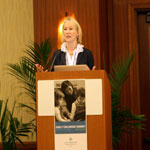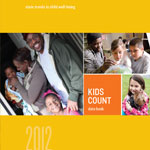Latest News at FTF
900 Early Childhood Champions Gather to Learn, Share, Grow
Did you know that a child's best chance to learn to speak a second language is between birth and 7 years old? Or, that play is one crucial way in which children develop executive functions of the brain, like self-control?
 Earlier this month, more than 900 early childhood teachers, professionals and advocates gathered for two days of learning, sharing and growing at the 2012 First Things First Early Childhood Summit. Earlier this month, more than 900 early childhood teachers, professionals and advocates gathered for two days of learning, sharing and growing at the 2012 First Things First Early Childhood Summit.
The summit's offerings included presentations by national researchers on the latest news in human brain development, including how infants, toddlers and preschoolers develop the skills and abilities that will make them successful in kindergarten and beyond.
The summit also included sessions on best practices and innovations in early childhood being implemented statewide.
In addition to offering insight on the programs children need in order to be successful in school, the summit presentations – some of which included policymakers in K-12 and post-secondary education – offered exciting implications on issues such as: training of the early childhood workforce; further alignment of the curricula among early childhood, K-12 and post-secondary education; and, ensuring that assessments of all Arizona students take in to account overall childhood development as well as content knowledge.
Policy Brief Discusses Link Between A Child's Early Teachers and School Success
Most of a child's brain develops in the first five years of life, and their early experiences lay the foundation for all their future learning. Parents are their child's first teachers, but many also choose to send their children to child care or preschool. Teachers in these settings hold the key to a child's first formal learning experience.
In "Professional Development for Teachers of Arizona's Youngest Children," First Things First discusses the link between great early childhood teachers and young children's learning.
This brief details professional development opportunities in Arizona and what First Things First and other organizations are doing to improve the early childhood workforce, including:
- Working to create consistency in how early educators are educated and trained;
- Providing higher education scholarships so that early educators can expand their skills in engaging young minds; and,
- Creating incentives to ensure the most educated and experienced teachers continue working with kids birth to 5 years old.
One of the best predictors of a child's success in school is the quality of the interactions between the child and their early teachers. As a community, we expect a lot from the early education workforce. In order to help them meet those expectations, we must give serious consideration to the education, compensation, and support they need to give all our children what they deserve: the opportunity to start school prepared to succeed!
Early Learning Can Help Reverse Disturbing Trends
By Rhian Evans Allvin, CEO, First Things First
A national report released in late July put Arizona among the bottom 5 states when it comes to the well-being of our children.
According to the KIDSCOUNT report, too many Arizona children grow up in poverty. Too many kids don't make the grade in reading or math. Too many teens get pregnant. And, too many students don't graduate from high school.
Also listed among these disturbing trends is that more than two-thirds of Arizona 3- and 4-year-olds don't go to preschool. Is it a coincidence that all of t hese startling statistics go together? hese startling statistics go together?
Research has demonstrated that children who have access to high quality early learning experiences are better prepared when they enter kindergarten. They are more likely to do well in school, graduate and go on to college. And, as adults, they can earn more and be healthier.
But, a quality early education can cost as much as tuition at state universities, and budget cuts mean that there's less help for families who struggle with basic needs, let alone early learning for their kids.
So, some would say, we can't afford to make early learning a priority for our kids. The KIDSCOUNT rankings show we can't afford not to.
Remedial and special education in elementary schools are costly and come too late for many kids. Early learning is cheaper and gives kids a strong foundation upon which to build their success in school and in life.
Support from schools, charities, faith groups and organizations like First Things First is helping many kids access quality child care, including preschool.
But, as a community, we need to use information like the KIDSCOUNT report, to continue the conversation about which investments are going to yield the best results, for our kids and for our state. To learn how you can join that conversation, visit AZFirstThingsFirst on Facebook.
Let's give our kids the tools they need to be successful from the start, so they can help put Arizona at the top of the list!
Partner News
O'Connor House Launches Centennial Voter Initiative
 The O'Connor House – founded by former Supreme Court Justice and Arizona native Sandra Day O'Connor – has announced a non-partisan initiative to enhance Arizona's voter participation. Called the Centennial Voter Initiative, this effort includes getting more Arizonans registered to vote, informed about important issues at the ballot box, and actually turning out to vote. The O'Connor House – founded by former Supreme Court Justice and Arizona native Sandra Day O'Connor – has announced a non-partisan initiative to enhance Arizona's voter participation. Called the Centennial Voter Initiative, this effort includes getting more Arizonans registered to vote, informed about important issues at the ballot box, and actually turning out to vote.
Arizona ranks in the bottom 10 states when it comes to all aspects of voter participation. About 84% of eligible Arizonan sare registered to vote, and of those, only about 52% actually turn out to vote. The goal of the initiative is to stimulate an informed and engaged electorate, regardless of party affiliation.
Many of the decisions that affect children birth to 5 are made by elected officials or by citizen ballot initiatives. Because of this, First Things First is proud to join other private and government entities in supporting the O'Connor House's efforts to "empower more Arizonans to believe in the democratic process and demonstrate their civic involvement by voting." |